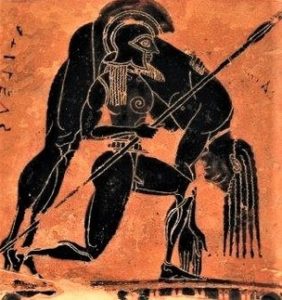BIOGRAPHY

Greater Ajax is one of two heroes to bear that name in the Trojan War. He was born to Telamon, king of Salamis and Eriboea (or Periboea). This made Ajax the great-grandson of Zeus, as his father was the son of Aeacus who was Zeus’s son. Ajax was the cousin of Achilles and half-brother of Teucer. He had two sons, Philaeus and Eurysaces, who would go on to give Athens the island of Salamis in return for the Attican franchise.
Not much is known of Ajax’s early life except that he grew up with his father on Salamis, in the Saronic Gulf off the coast of Attica, and that he was among the suitors of Helen. Non-Homeric writers added to his story, telling that he gained invulnerability thanks either to a prayer offered by Heracles to Zeus (Apollodorus and Pindar) and that he was named Aias after an eagle that appeared as a favorable omen; or that Heracles made Ajax invulnerable by Heracles wrapping him in his lion’s skin (Lycophron). From this place he brought forth twelve ships to fight in the siege of Troy.
During the Trojan War, Ajax led raids against Chersonesus, controlled by Thrace, taking prisoner Polydorus, a Trojan prince, along with great wealth. He also raided Phrygia, where he killed King Teuthras (Teleutas) and took home more spoils of war along with the King’s daughter, Tecmessa, who would bear him his sons.
During the fighting under Troy’s great walls, Ajax distinguished himself mightily, garnering a reputation as the second most distinguished and bravest Greek second only to Achilles. He is described as being very tall, with his head and shoulders rising above those of all the other Greeks. He had broad shoulders and was both strong and beautiful, again second only to Achilles. He was known for his massive, seven layered, leather shield, which often served him well and was nearly impregnable in battle.
Ajax is among the few Greek fighters who faced down Hector and lived to tell the tale. When, in order to win respite for his army, Hector challenged the Greeks to send their bravest to fight him in single combat, Ajax was one of the few who offered and was the one who’s lot was chosen. He was so mighty that Hector himself is described as trembling at the sight of him. During their duel, Ajax gained the upper hand on Hector by blocking his spear throw and nearly killing Hector with his return throw. He then picked up a massive stone and drove Hector to the ground with it. He seemed to be on the verge of ending the Trojan prince’s life, when heralds of the gods called for a cessation of hostilities due to nightfall. As a token of the respect Ajax and Hector had for one another, they exchanged Hector’s sword for Ajax’s girdle following their match.
He went on to face Hector several more times, though never getting as close to killing him. Ajax was among the party that attempted to convince Achilles to rejoin the war when Hector was threatening the Greek fleets, showing how important he was, though his fleet was small. Here again Ajax came close to besting Hector with a thrown stone. However, Apollo intervened again, saving Hector and Ajax is forced to retreat, allowing Ajax’s ship to burn.
Ajax carried Patroclus back to the Greek camps helped by Odysseus following the hero’s death, with some stories telling of Odysseus trying to murder him on the way back to the Greek camp in order to keep all the glory to himself. In the games celebrating Patroclus, Ajax fights Odysseus, but is unable to defeat him, and also fails to defeat Diomedes.
Following the death of Achilles, the Greeks hold a competition to see who will receive his armor. In this competition, Ajax is bested by Odysseus. Here while Homer does not go into depth, other authors tell of the loss driving Ajax to madness, causing him to kill many Greek sheep, thinking them to be his enemies. Upon coming to his senses, Ajax took his own life with the sword Hector had given him. Other tales tell of him dying at someone else’s hand. He never forgave Odysseus, even in death refusing to speak with Odysseus when the later ventured to Hades and tried to make amends.
It is said that a flower grew from where the blood of Ajax spilt with the letters αi on its petals (Pausanias), representing Ajax. His ashes were either placed by Neoptolemus in a golden urn on Mount Rhoeteion (Dictys Cretensis), or buried by his brother Teucrus (Sophocles).